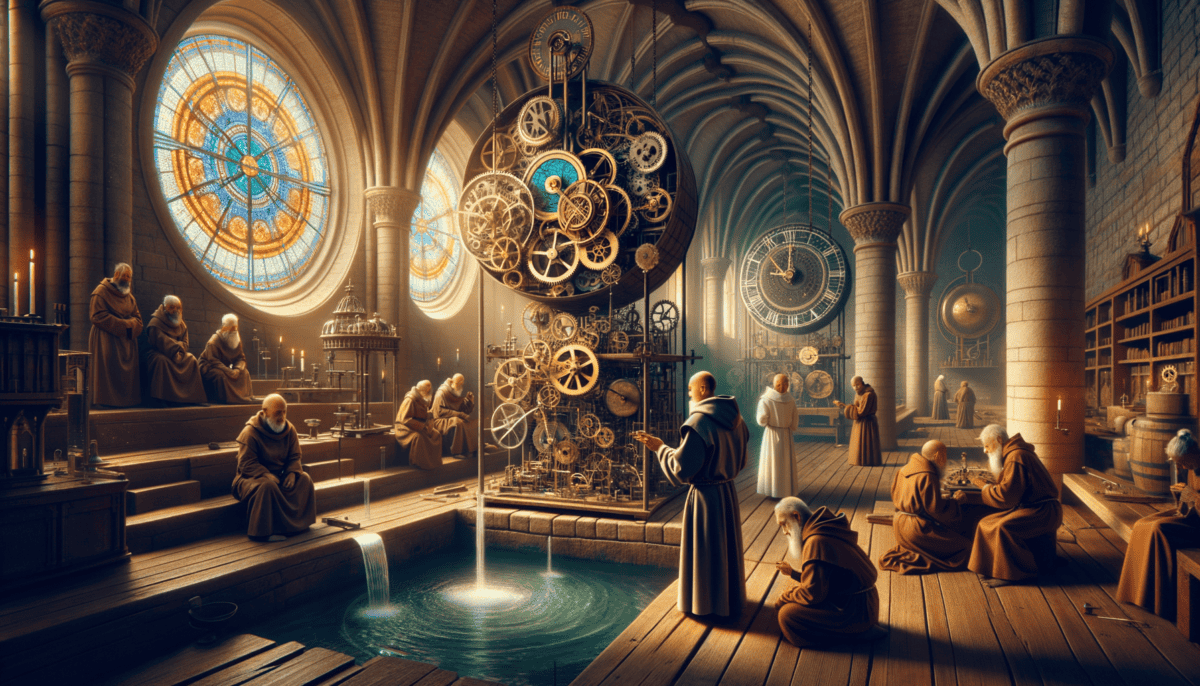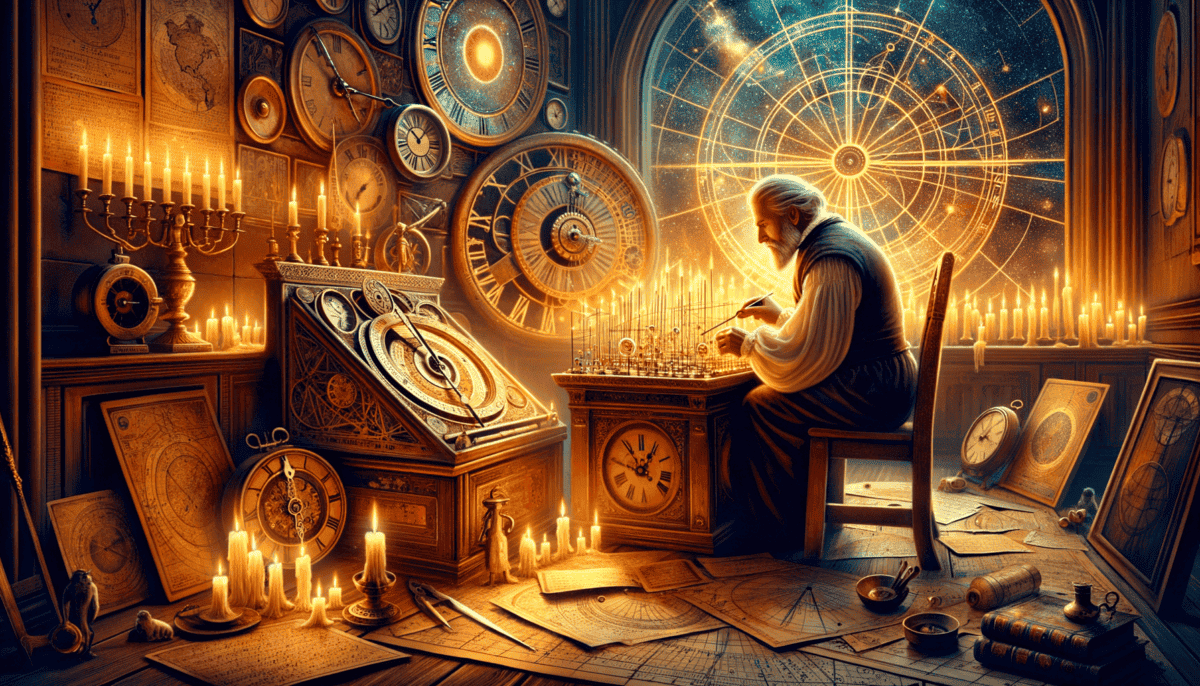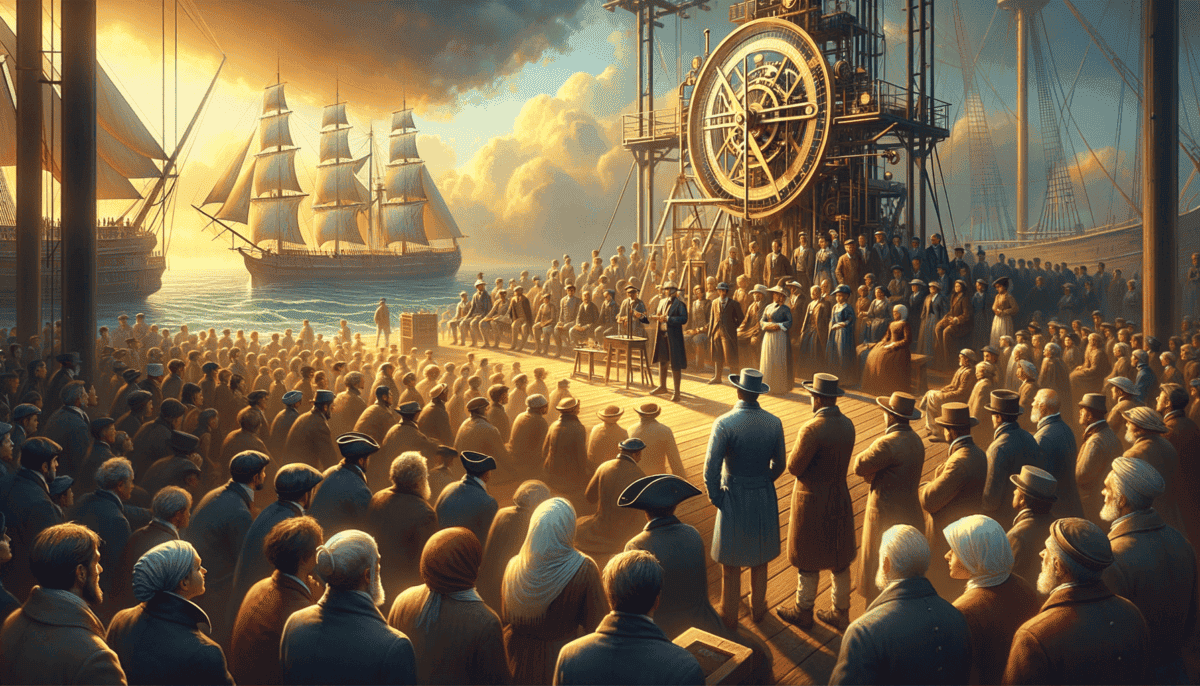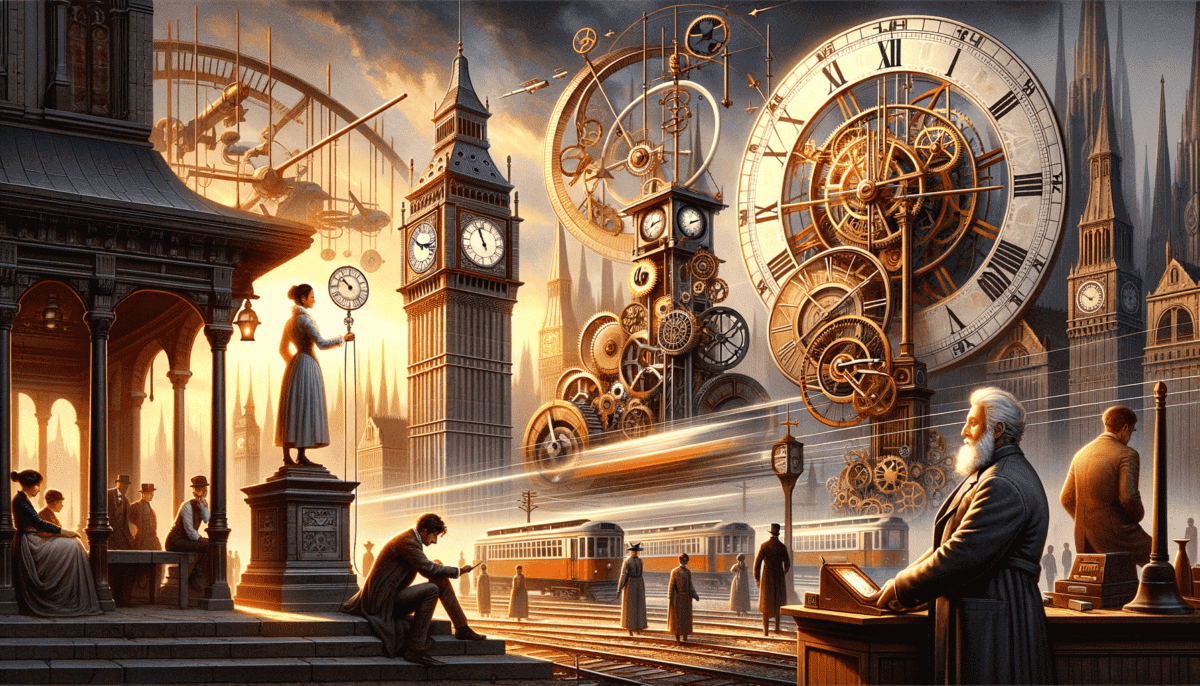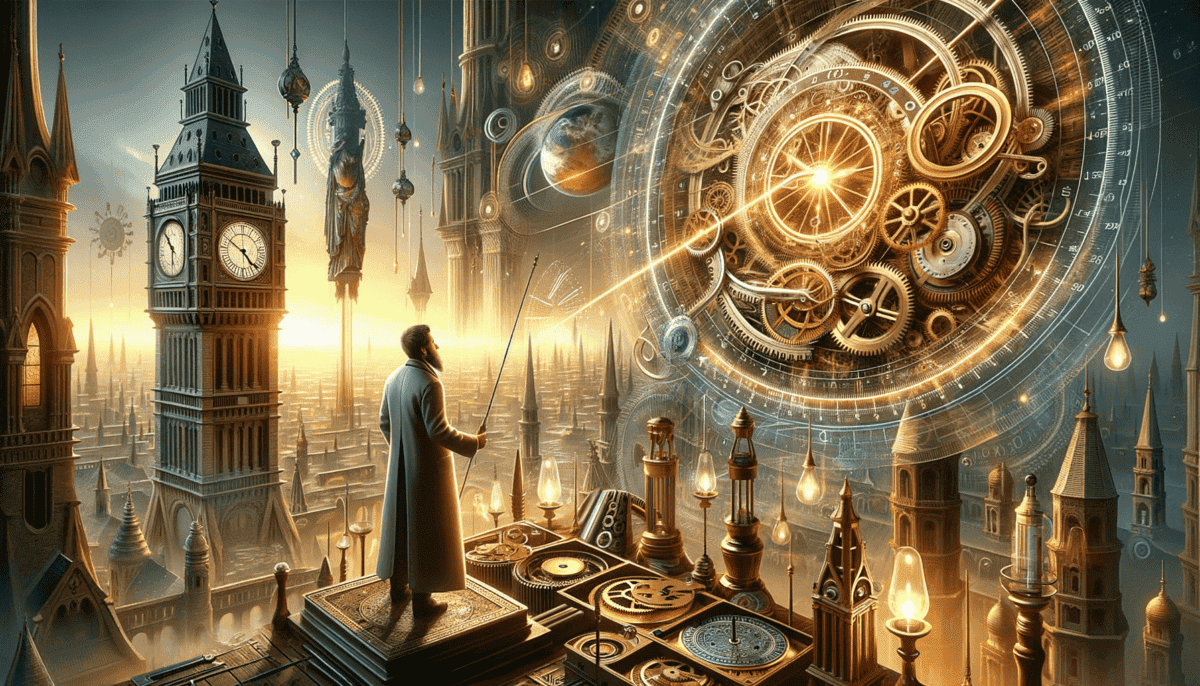Shadows and Sundials
Maya squinted at the tall stone pillar in the bright Egyptian sun. Her grandfather, the royal timekeeper, stood beside her in his flowing robes. The shadow from the pillar stretched across the dusty ground like a giant finger pointing the way.
"Watch carefully, little one," Grandfather said, his eyes twinkling. "The shadow tells us many secrets."
Maya loved learning about time with her grandfather. Every day, they would visit the royal sundial in the palace courtyard. It wasn't just any stone pillar – it was a special tool that helped everyone know when to wake up, eat, and go to sleep.
"But Grandfather," Maya asked, twirling her dark hair thoughtfully, "how did people first learn to watch time?"
Grandfather sat on a nearby stone bench, patting the space next to him. Maya hopped up, eager to hear another story.
"Long, long ago," he began, "our ancestors noticed patterns in the sky. They saw how the sun moved across the sky every day, just like clockwork."
Maya watched as a group of workers nearby looked at the sundial's shadow. They needed to know when to take their lunch break.
Nature’s First Clock
"Before we had sundials," Grandfather continued, "people used many things in nature to track time:"
• The sun rising and setting
• Birds singing in the morning
• Flowers opening and closing
• Stars appearing at night
• Seasons changing through the year
"Look," Maya pointed excitedly. "The shadow is moving!"
Indeed, the shadow was creeping slowly across the marked lines on the ground. Each line showed a different time of day.
"That's right," Grandfather smiled. "In Mesopotamia, they use similar sundials. Even in far-away lands, people watch the sun's shadow to know the time."
The Shadow Game
Maya jumped off the bench. "Can we play the shadow game again?"
Grandfather nodded, and Maya ran to stand next to the pillar. She stretched out her arms and watched her own shadow dance on the ground.
"Remember," Grandfather called out, "shorter shadows mean it's closer to noon. Longer shadows tell us morning or evening is near."
Later that afternoon, as the sun began its descent, Maya helped her grandfather mark the day's observations in his scroll. She drew careful pictures of the shadow positions they had seen.
"Tomorrow," Grandfather promised, "I'll show you how we use water to track time when the sun doesn't shine."
Maya's eyes widened with excitement. There was still so much to learn about tracking time, and she couldn't wait to discover more of time's ancient secrets.
The evening birds began their songs, signaling the end of another day. As Maya and her grandfather walked home through the palace grounds, the sundial's shadow grew longer and longer behind them, stretching toward tomorrow's adventures.
"Time never stops moving," Grandfather whispered, "just like the shadows never stop dancing."
Maya smiled, knowing she was learning something very special – the art of catching time itself.
Water, Wheels, and Whispers of Mechanism
Brother Thomas hurried through the monastery’s stone corridors. The water clock needed checking again!
“Marcus!” he called to his young apprentice. “Come quickly! It’s time for the morning measurement.”
Ten-year-old Marcus ran to catch up, his wooden sandals clicking against the floor. He loved helping with the monastery’s timekeeping devices.
“Look here,” Brother Thomas pointed to the large copper vessel. “Watch how the water drips steadily, marking each hour.”
Marcus peered into the bowl. Tiny marks lined the inside, showing how the water level dropped as time passed. It was like magic!
The Mystery of Moving Water
“But Brother Thomas,” Marcus asked, “why do we need so many different ways to tell time?”
The old monk smiled, adjusting his brown robes. “Well, you see, we monks need to know exactly when to ring the bells for prayers. We can’t always use sundials because:”
- It might be cloudy outside
- We need to track time at night
- Winter days are shorter than summer days
- Some prayers happen before sunrise
- We must be precise with our schedule
Just then, they heard a strange clicking sound from the workshop next door. Marcus’s eyes lit up – he knew what that meant!
The New Wonder
“Can we check on Master William’s invention?” Marcus bounced excitedly.
Brother Thomas nodded. Together, they walked to the workshop where Master William, the monastery’s craftsman, was building something very special – a mechanical clock.
“Come in, come in!” Master William waved them over. His workbench was covered with metal wheels, gears, and springs. “Want to see how it works?”
“These wheels,” Master William explained, holding up a toothed gear, “work together like a team. When one moves, it pushes the next, and the next, keeping perfect time.”
Marcus watched in wonder as Master William demonstrated with two small gears. “It’s like a metal dance!” he exclaimed.
“Exactly!” Master William laughed. “And soon, this clock will help us track time better than ever before.”
A New Time Begins
As they worked, Brother Thomas told stories about how timekeeping was changing across Europe. Big churches were building tower clocks. Towns were starting to run on scheduled time.
“Listen,” Brother Thomas said suddenly. Marcus heard the familiar splash of the water clock mixed with the tick-tock of Master William’s gears.
“It’s like two different songs about time,” Marcus whispered.
“Yes,” Brother Thomas agreed. “The old way and the new way, working together. Soon, mechanical clocks will change how everyone thinks about time.”
Master William handed Marcus a small gear to hold. “Maybe someday,” he said with a twinkle in his eye, “you’ll help build even better clocks.”
As the day went on, Marcus helped check the water clock and watched Master William work. He couldn’t wait to see what new secrets of time tomorrow would bring.
The monastery bells rang out across the valley, marking another hour passed. But for Marcus, time had never felt more exciting.
Galileo’s Swinging Discovery
The cathedral was quiet except for the soft swaying of the brass lamp hanging from its long chain. Young Maria watched it, fascinated. ️
“Papa, look!” she tugged at her father’s sleeve. “The lamp moves back and forth like a dance!”
Galileo Galilei smiled at his daughter’s observation. He had noticed something special about that swaying lamp too.
“Want to help me with an experiment?” Galileo asked Maria. Her eyes lit up with excitement.
The First Test
Back home, Galileo tied a small weight to a string. Maria watched as he held it up.
“Now, watch carefully,” he said, letting the weight swing. “Count with me: one, two, one, two…”
Maria counted along, amazed that the swings kept perfect time. “It’s like music, Papa!”
They tried different weights and different lengths of string. Every swing told them something new about time.
A Better Way to Keep Time
The old clocks had problems:
- They ran too fast when hot
- They ran too slow when cold
- They weren’t very accurate
- They needed lots of care
- They cost too much to make
But Galileo’s swinging weight – called a pendulum – always kept perfect time!
Sharing the Secret
“Maria,” Galileo said one evening, “would you like to help me draw pictures of our invention?”
Together, they sketched designs for a new kind of clock. Maria added little stars and moons to the drawings.
“People everywhere will use this to tell time better,” Galileo explained. “Ships at sea, scientists in labs, even churches ringing their bells.”
“Will they know it started with a swinging lamp?” Maria asked.
Galileo laughed. “And a curious little girl who liked to watch it dance!”
Time Marches Forward
“Look, Papa!” Maria pointed to their newest pendulum clock. “It’s still keeping perfect time!”
The steady tick-tock filled their workshop. Other scientists came to see Galileo’s invention. Each one left amazed by how well it worked.
“You’ve changed how we track time,” a visiting professor said.
Maria beamed with pride. She knew her father’s discovery would help people for years to come.
As the sun set outside their window, father and daughter watched their pendulum swing. Each movement brought the world one step closer to better timekeeping.
The Race Against Time
The salty wind whipped across the deck as Captain James stood at the helm of his ship. The sky was dark with storm clouds.
“Where are we?” asked young Thomas, the cabin boy.
“That’s the problem, lad,” the captain sighed. “Without knowing the exact time, we can’t be sure.”
A Sailor’s Challenge
Ships often got lost at sea because they couldn’t tell where they were. They needed two things:
- The position of the sun
- The exact time back in London
- A way to stay on course
- A reliable clock that worked on ships
- Brave sailors willing to test new ideas
Enter John Harrison
In a small workshop in England, a man named John Harrison was working hard. He wanted to build a special clock for ships.
“Father, why are you using so many different metals?” asked Elizabeth, his daughter.
“Because, my dear,” Harrison smiled, “each metal moves differently in hot and cold weather. Together, they’ll keep perfect time!”
Harrison worked for many years. He built clock after clock, making each one better than the last.
The Amazing Sea Clock
“Look!” Elizabeth pointed at their newest clock. “It’s still ticking even when I rock it!”
Testing at Sea
The British government offered a big prize to anyone who could solve the problem. Harrison’s clock was ready for the test.
“Will it work, Father?” Elizabeth asked as they watched the ship leave port.
“We shall see, my dear. We shall see.”
The clock traveled across the ocean. Day after day, it kept perfect time. The sailors couldn’t believe their luck!
A New Age of Discovery
Thanks to Harrison’s clock, ships could now know exactly where they were. Sailing became much safer.
“You’ve saved countless lives,” the admiral told Harrison. “Your clock will change how we explore the world.”
Elizabeth hugged her father. She knew his hard work had made a difference.
As ships sailed safely across the seas, Harrison’s clock ticked steadily, marking each moment of their journey. The world had become a little bit smaller, and a lot safer, thanks to one man’s determination to solve the puzzle of time at sea.
The Time Revolution
The steam whistle pierced the morning air as workers hurried to the factory. Little Emma clutched her father’s hand, watching the busy streets of London in 1850.
“Papa, why is everyone rushing?” Emma asked, dodging a horse-drawn carriage.
“Because of that!” Her father pointed to the giant clock tower ahead. “Everyone must be at work exactly when the clock strikes eight.”
A New Way of Life
“But Mrs. Baker’s clock says something different than the factory clock,” Emma noticed.
“That’s why we need to fix it,” her father explained. “The trains are changing everything.”
The Railway Time
Mr. Thompson, the railway master, stood on the platform with his shiny pocket watch.
“All stations must have the same time now,” he announced to the crowd. “No more confusion about train schedules!”
People gathered around as workers installed new clocks at the station. For the first time, everyone would follow the same time.
Time in Every Home
Emma watched as her father brought home something special – their very own clock!
“Look how it’s made,” he showed her. “Hundreds of clocks just like this one are being made in factories every day.”
Connecting the World
The telegraph lines stretched across the country, carrying an important message: the exact time. ⚡
“It’s like magic,” Emma whispered, watching the telegraph operator at work.
“Better than magic,” the operator winked. “It’s science!”
A Different World
Life changed as everyone started following the same time schedule:
- Trains ran on exact schedules
- Workers knew when to start and finish
- Schools began and ended at set times
- People could plan meetings more easily
- The whole country worked together like clockwork
“Papa,” Emma said one evening, watching the sunset. “Do you think people will ever forget about sun time?”
Her father smiled, checking his pocket watch. “The sun still guides us, Emma. We’ve just learned to measure its journey more precisely.”
As street lamps flickered to life, Emma thought about how different the world was becoming. Time wasn’t just in nature anymore – it was in everyone’s pocket, on every wall, and in every train station. The age of precise time had begun.
Digital Dawn
Little Zoe stared at the glowing numbers on her bedside clock. “Dad, how does this clock know the exact time?” she asked, fascinated by the pulsing dots between the hours and minutes. ️
A Tiny Sun in a Box
“Come with me,” Dad smiled, leading Zoe to the science museum. “I want to show you something amazing.”
They stood before a large glass case containing a strange-looking machine with lots of lights. “This is an atomic clock,” Dad explained. “It uses tiny bits of matter called atoms to keep perfect time.”
Time Around the World
Dr. Sarah Chen, the museum scientist, joined them. “Want to see something cool?” she asked Zoe.
On a big screen, they watched as dots of light connected across a world map. “Every country shares the same time system now,” Dr. Chen explained. “We call it UTC – Universal Time Coordinated.”
Satellites high above Earth help keep all our clocks in sync – from phones to computers to space stations!
The Time in Your Pocket
Zoe pulled out her mom’s old phone. “This shows the exact time too!”
“Yes,” Dr. Chen smiled. “Your phone talks to satellites in space to know the precise time, no matter where you are.”
The Future of Time
In the museum’s special exhibition, Zoe saw new ways scientists were working to measure time:
- Quantum clocks that use light waves
- Space-based atomic clocks
- Time crystals that could change everything
- Super-accurate clocks for exploring deep space
- New ways to sync time across the universe
Looking Back, Moving Forward
“From sundials to atomic clocks,” Dad mused, “we’ve come so far in measuring time.”
Zoe thought about all the ways people had learned to track time – from watching shadows move across the ground to building giant mechanical clocks, and now using tiny atoms to count seconds.
“The story of time isn’t over,” Dr. Chen added. “Every generation finds new ways to understand and measure it better.”
As they left the museum, Zoe looked at her digital watch with new appreciation. In its glowing numbers, she saw thousands of years of human curiosity and invention – from ancient sundial makers to modern scientists, all trying to understand time’s endless dance.
The sun was setting, painting the sky in beautiful colors. Some things about time would never change – like day following night, and seasons flowing one into another. But now, thanks to human ingenuity, we could measure each precious moment with incredible precision, connecting people across the whole world in a symphony of synchronized time.
Zoe smiled, knowing she was part of this amazing story – the story of how humans learned to catch time in their hands and share it with everyone.


